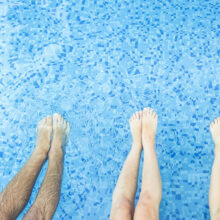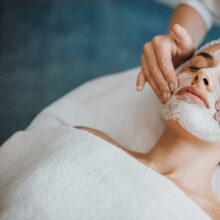The Lowdown on Snoring: Why Do People Snore? Plus, Natural Remedies
- Published: Thursday, February 28th 2013
- in Living Well
By Vanessa Voltolina

Your spouse is known for snoring sounds reminiscent of a bear. Or, maybe you’re the one consistently sucking in the drapes. While most of us view snoring as a minor nuisance, it may be impacting your physical, mental and emotional health. Luckily, there are easy lifestyle remedies that may help you (and your loved ones) get a better night’s rest.
Why We Snore
Snoring is the sound that comes from turbulent vibrations of airflow in our nose and throat tissues while we sleep, explains Lashaun Dale, senior national group fitness creative manager at Equinox in New York City. When this airflow is obstructed, we snore; the most advanced stage, which you’ve likely heard of, is obstructive sleep apnea.
Of course, there’s no one reason why we snore. It can be due to hypertension, viral illness, or even certain medications—or one of these factors:
- Your diet—especially allergic reactions that increase inflammation and phlegm—contribute to snoring. Dairy and wheat are often to blame, but eating too much food and not fully digesting before sleep can lead to snoring, too.
- Poor posture and sleeping position can lead to a narrowing of the back of the throat, nose or mouth. The same amount of air passing through this smaller opening can cause the tissues surrounding it to vibrate, creating a snoring sound.
- Physical conditions or injuries may have caused an obstruction of the nasal passages. Consider if you have a deviated nasal septum, allergies (tissue swelling), sinus infections, or swelling of the tonsils in the back of the throat. The flow of air through the mouth creates greater vibration of tissues.
You may think: As long as it’s not bothering anyone, why does snoring even matter? Sleep is often lauded as a critical way to help our bodies heal, boost the immune system, and keep us energized. When you aren’t getting enough sleep—even if you aren’t aware that snoring is the culprit—your whole world can feel off-kilter, leaving you fatigued, irritable, and with an increased chance of suffering from obesity and depression.
Of course, if you’re prone to chronic snoring, consider having your doc make sure it’s not a sign something more serious. And if you’re unsure how often you snore, record yourself with a smart phone during the night, suggests Dale.
Natural Remedies for Better Zzzs
Lifestyle changes are one of the main areas of natural (non-surgical) treatment of snoring, says Dale. If you snore, consider one, or all, of these six natural remedies:
- Eat Healthier: New research offers more evidence that eating the right foods improves sleep quality, and less sleep leads to noshing on more calories. Since obesity is highly correlated with sleep apnea, snoring and other sleep issues, it’s easy to see how this turns into a vicious cycle.
- Improve Air Quality:Add snoring to the list of reasons you should quit smoking. Even if you don’t, clean air can make for better breathing, and therefore improved sleep. The overall air quality of your room and home—from dust, chemicals and other pollutants—may be aggravating your nasal tissues during the night. “Try a hot shower and use a Neti pot to help keep nasal passages open,” Dale says.
- Set Up for Sleep:“Often, lying on your back will increase snoring, if you’re prone to it,” says Dale, “because this position forces the base of the tongue and soft palate to collapse to the back wall of the throat, causing a vibrating sound.” Her suggestion? Get comfortable by adjusting your pillows and investing in a good-quality mattress. Consider a body pillow that supports your entire body and practice sleeping on your side.
- Forgo the Nightcap: Snoring is associated with increased alcohol consumption, as well as sedatives; these reduce the resting tone of the muscles in the back of your throat, making it more likely you’ll snore. “Drinking alcohol four to five hours before sleeping often makes snoring increase,” says Dale.
- Stay Hydrated: “Dehydration means that the secretions in your nose and soft palate are congested, stickier and this leads to more snoring,” she says. Drink half your bodyweight in ounces every day.
- Snuggle More: Sharing snuggles can improve sleep and commitment to health habits. “Create a plan with your partners to be a positive influence around keeping reasonable bedtimes, not using electronics or TV around bedtime,” she says, “and if you need a treatment for sleep apnea or snoring, to continuously and consistently use it.”
* * * * *
You might also like:
How to Get Your Body Ready for a Good Night’s Sleep
Spa + Sleep = Pure Relaxation: Treatments to Help You Snooze
Not a Runner? Not a Problem! 5 Best Everyday Cardio Exercises
Unlock the Formula to Beautiful, Hydrated Skin: 7 Skin-sational Tips from BABOR
Give Yourself the Gift of Silence Through Ayurveda & Shirodhara



